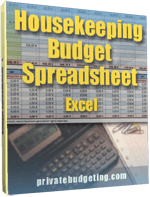How much budgeting do you [really] need?
Before you spend hours comparing apps and online services that look like the answer to all your organizational needs and then spend more time getting your new system to work, think about what you need and how much time you want to spend maintaining your records on a regular basis.
Whatever your reasons to budget might be, there is no specific rule about how budgeting should be done. In fact, the more people or "experts" you consult for financial advise (or any advise, for that matter) the more diverse the answers and the broader the range between what's considered a "good" and a "bad" budgeting strategy will be. Some even say that "Budgeting is a bad idea." However, when it comes to personal finance, there are classifications that everybody sure can agree on, such as debts are bad, emergency funds are good, overdrawing your account is bad and earning interest on your savings is good. To have something to go on, consider the following main reasons for keeping a financial record before you settle on a certain budget planning tool.1. What are your main reasons for keeping a financial record?
- Tracking your spending (cut your overall spending, shed light on bad spending habits and ensure you don't spend money that you don't have)
- Monitoring your savings goals (discover opportunities to save money)
- Finding ways to pay down debts quicker
- Monitoring your investments / build savings
- Recording tax-deductible purchases and payments
- Making sure you have enough money for a happy retirement
- prepare better for emergencies
Note: If one of the above reasons is of particular importance to you, look for a scheme that emphasizes your priorities. You’ll save time if you focus on systems that accommodate features that fit your needs and don't require you to find work-arounds for elements that were designed with other consumers in mind.
You'll most likely come up with more reasons to budget that you can turn into individual goals, which help you to narrow down eligible budget solutions. If the spectrum of what you need to reach your goals ranges between "a spreadsheet or traditional budgeting would do just fine," and "I need an accountant," where do you see yourself?
2. How much effort are you willing to put into budgeting?
Before choosing a budgeting system, it is useful to think about how much effort you are are willing to put into keeping your finances up to date. Some budgeting tools have stricter requirements regarding the documentation of financial data than others. Excel spreadsheets and zero-based budgeting, for example, work best and reflect the financial situation best when data is collected regularly at not-too-long intervals. If your Excel spreadsheet has the appropriate functionality, then there is no need to manually enter recurring data, as this can also be done by the Excel budget spreadsheet, based on the initial starting value of your expenses. Creating and regularly maintaining an accurate account of your finances down to the last penny can be time-consuming and tedious, though, especially when it comes to comparing actual expenditure with the budget. However, this type of budgeting works very well and provides the most accurate results. People who like to be methodical and organised may even find some satisfaction and fun in this type of budgeting. But if you find that you lack the necessary motivation, you might be better off trying the "pay yourself first" method.The pay-yourself-first method, where you set aside some money for yourself first before deciding what to do with your debt, and financial apps that sync with your financial accounts tend to require less attention.
Of course, it is not set in stone how often you should budget. For example, if you are someone who does not want to go into too much detail when documenting finances, because you are only interested in the broad outlines of the whole and documenting small amounts would not have much of an impact for you anyways, then you don't need to know that your last gas bill was exactly $56.56. In this case, all that matters to you probably is just that you are somehow within general, predefined parameters. If your income and expenditure are in line with the corresponding financial categrories that have an impact on your life, such as your income, your fixed expenses, your debts and your general expenses, then it may not even be necessary to follow a particular budgeting system. It might actually be enough to review your financial information a couple of times a month or just a a few times a year. For those who are still undecided about how best to manage their money and what kind of budgeting solution is right for them, may want to check out this easy to use Excel spreadheet that has some useful automation features.
